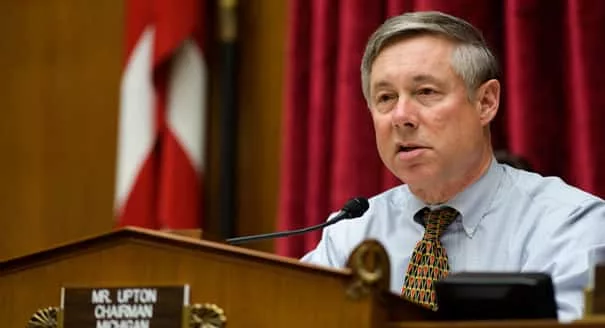It has now been more than two weeks since the federal pipeline safety program expired in America, and Fred Upton is not happy about that. He’s not just sitting by, however, he has introduced legislation today in the form of a Congressional House Resolution called “The Pipeline Safety Act of 2019.”
The St. Joseph Congressman has introduced this morning H.R. 4700, the Pipeline Safety Act of 2019, which would reauthorize the nation’s pipeline safety program for two years and provide the Pipeline and Hazardous Material Safety Administration (PHMSA) and the states with additional resources and new authorities to accelerate the hiring of pipeline inspectors. The legislation aims to better protect the nation’s 2.7 million miles of pipeline infrastructure.
The federal pipeline safety program’s 2016 authorization expired on October 1.
Upton says today, “Pipeline safety is an issue that’s deeply personal to me, and I look forward to working with both my Republican and Democratic colleagues to get a bipartisan reauthorization across the finish line.” He adds, “This process has historically been bipartisan. That’s why it’s most unfortunate that my Democratic colleagues have decided to move forward with their own partisan plan. The fact is their plan isn’t going to become law with a Republican Senate and a Republican President. We have divided government and the only way we’ll complete this reauthorization is if the parties work together, which is why I’m introducing this bill that can actually gather bipartisan support.”
Upton argues, “Protecting our pipelines, ensuring the safe delivery of our energy resources, and making sure we do right by our environment are too important to let political rhetoric and minor disagreements get in the way of a final product.”
Pipeline safety is regulated by PHMSA, which is part of the U.S. Department of Transportation. PHMSA regulations set standards on the construction, operation, and spill response for the nation’s pipelines.
Upton says he has long been a supporter of strong pipeline safety laws, noting that on July 25, 2010 in Marshall, Michigan – a city east of his own congressional district – a pipeline burst spilled 20,000 barrels of oil into the Talmadge Creek, a tributary of the Kalamazoo River.
Upton chaired the Energy and Commerce committee during the past two reauthorizations of the federal pipeline safety program.
The 2012 reauthorization – which followed the July 2010 pipeline spill into the Kalamazoo River in southwest Michigan – cut down on incident reporting times and increased financial penalties for violations. The 2016 reauthorization included language that required mandatory annual inspections for certain pipeline crossings, such as Enbridge’s Line 5, which crosses the Straits of Mackinac at a depth of more than 250 feet below the surface of the water.
Both reauthorizations were passed with strong bipartisan support.
Upton has recently published two op-eds urging House Democrats to work with Republicans to once again pass a pipeline reauthorization on a bipartisan basis.
You can click this link to learn more about the Pipeline Safety Act of 2019:






